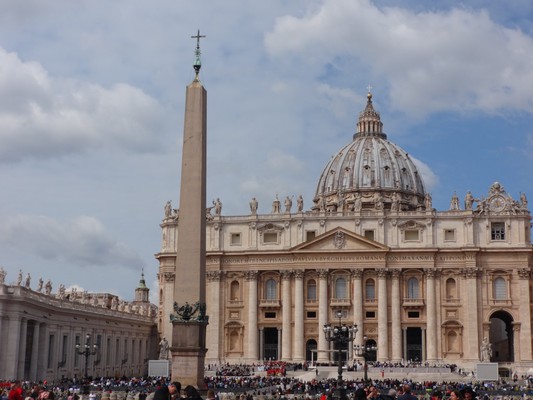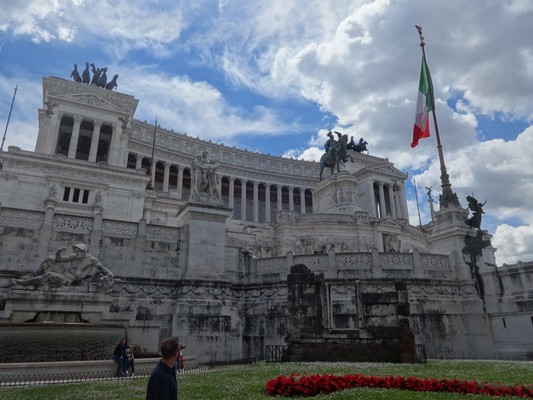"And thus Nero did not last longer than a wind, a fire, a war or a plague, and St. Peter's Cathedral now dominates the city and the world from the Vatican hights." („Quo vadis“, H. Sienkiewicz)
What are the roots of our European culture?
Maria Fellner - 03.01.2020 @ 20:55
The roots of European culture - antiquity and the Bible?
by Dominika Gwóźdź, VIII LO Kraków / Poland
Nowadays, we can observe the clash of traditions developed over the years. They get mixed and blend. Globalization is slowly blurring cultural differences and creating a new picture of European culture. Do the roots and basic values of European culture from the beginning of its development cease to be valid?
Where exactly does European culture come from? There are said to be three main sources: ancient Greece, the Roman Empire and the Christian faith, based on the Bible and the Ten Commandments. Henryk Sienkiewicz shows the beginnings of Christianity in his novel ‘Quo Vadis’. It presents the story of the love of a Roman patrician and a Christian woman, people from two different worlds, against the background of the persecution of Christ's followers, who were considered potentially dangerous to the peace and order of the Roman Empire. Caesar Nero, in order to get rid of the new religious group, accuses it of setting the eternal city on fire and begins the slaughter. He organizes circus shows where defenceless people are torn apart by wild animals as a punishment for the attack on the Empire. However, Christians survived these difficult times and even expanded their community throughout the world. Nowadays, many people try to cut themselves off from Christian values and thought, believing that faith is obsolete, and that man is a self-sufficient being who does not need God. Unfortunately, Christians are today the most persecuted social group, also in Europe. Even if Europeans are trying to deny their Christian past, today we are still counting the time since the birth of Christ, and the Christian way of thinking is deeply rooted in our mentality.

The next pillars of our culture are: Roman law, which is the prototype of every code and legal system that exists today, and Athenian democracy, which we often refer to while claiming our rights. We should also mention the science and art of those times. The reasoning of Socrates, Plato or Seneca, considered to be the fathers of philosophy, is the basis of our perception of the world. To this day, we use the mathematical theorems of Pythagoras and Thales. The origins of most literary genres can be found in ancient times. Masterpieces such as Homer's ‘Odyssey’ and ‘Iliad’, or ‘History of Herodotus’ are still read, and the problems raised in them are still valid for many modern people. Theatre, which originated in antiquity and played an important role in the development of European culture, is also worth mentioning. Roman scholars also attempted to create the first encyclopaedia. These are only some of the achievements, which laid the foundations for European culture and have survived to our times in their original or "improved" form.

I believe that the values which the history of European culture brings are always present and should be respected. What will we do when we ‘erase’ the achievements built on these three pillars: Christian faith, Roman law and Athenian democracy? We cannot cut off the past, consider it useless and start from scratch. We can’t change it, but we have the power to decide about our future.
Dominika Gwóźdź - 22.02.2020 @ 21:40
Hi Dominika,
Thanks for the article! I personally have never thought about European culture in this particular way, mentioning Ancient Greece, the Roman Empire and Christian faith in one sentence, even though they are inconsistent with one another, and saying that together they build up today's culture was quite new, but nonetheless interesting to hear.
Believing that faith is obsolete is not a new thought nowadays, nevertheless denying the roots and wanting to distance oneself from them is the wrong way. I agree that these three factors are all important, but I have to say that I don't think that the roots and basic values of European culture from the beginning of its development cease to be valid and I don't believe we will erase those achievements. Whether it's politicians trying to hinder modern democracy or it's people denying faith and God, still no one e.g. questions the equations and formulas of brilliant Greek mathematicians or in this case that these achievements are part of our roots and therefore our whole culture. What we must do is take them as a base and build up on them so that we can look into a bright future and solve today's issues.
Valentin Innerbichler - 28.4.2020 @ 14:53